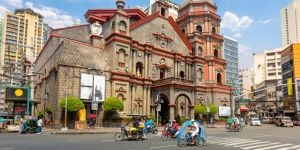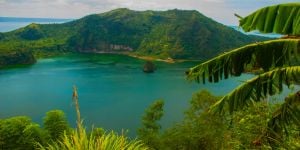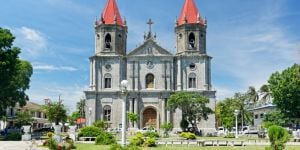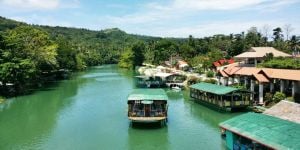Proper homesteading in the Philippines
Note, and this is important, I'm under no illusion that I'll be able to earn a living from this. This is purely a living arrangement type thing, work is a separate activity for me that relates to remote contracting for tech companies, something I already do. In other words, think prepper, Philippines edition

- Are you homesteading yourself?
- How arduous of a journey was it to set up autonomy or near-autonomy from the grid?
- Do you find that access to technology is still manageable from import without too much-added cost?
- How are you handling 'security' matters?
- What do you make of initiatives such as the upcoming Starlink?
- Is the government hostile to homesteading in general or do you feel 'left alone' by the authorities?
- Do you need to renew your homesteading agreement every 5 years?
Thank you and nice meeting everyone!
A Filipino asked me recently:Hello! Evidently, anyone who made the treacherous hike to farms in Sadanga will know that many Filipinos "homestead" by default and that living on a farm is not a special experience for many Pinoys.However, what I'd like to implement is refered to as "westernized Homesteading" - so called "return to the land" from urbanites to the provinces with access to capital to install generators, solar, gain access (and store) water, and advanced farming technologies such as hydroponics.
Note, and this is important, I'm under no illusion that I'll be able to earn a living from this. This is purely a living arrangement type thing, work is a separate activity for me that relates to remote contracting for tech companies, something I already do. In other words, think prepper, Philippines edition
 The clever ones. They prepare so they can do as you do* An other type are them, who spend crazy much space and money at USE UP things, but nothing at seeds and tools. Some spend a lot at bottled water, but nothing at cleaning water equipment!!!
The clever ones. They prepare so they can do as you do* An other type are them, who spend crazy much space and money at USE UP things, but nothing at seeds and tools. Some spend a lot at bottled water, but nothing at cleaning water equipment!!!I'm particularly interested in expat experiences (as they had to set up legal entities or naturalize since no ex-pat can own land) and communitarian experiences if any.
- Are you homesteading yourself?
- How arduous of a journey was it to set up autonomy or near-autonomy from the grid?
- Do you find that access to technology is still manageable from import without too much-added cost?
- How are you handling 'security' matters?
- What do you make of initiatives such as the upcoming Starlink?
- Is the government hostile to homesteading in general or do you feel 'left alone' by the authorities?
- Do you need to renew your homesteading agreement every 5 years?- @mongoosemutilator538
Thank you and nice meeting everyone!
 In Sweden its allowed to forage many wild growing things at private land as forest companies too, so I half my food costs easy during season. I DONT count myself as prepper, but in difference from the preppers, who only store use up things, I can manage "for ever", while they would manage only until their use up things will be used up...))
In Sweden its allowed to forage many wild growing things at private land as forest companies too, so I half my food costs easy during season. I DONT count myself as prepper, but in difference from the preppers, who only store use up things, I can manage "for ever", while they would manage only until their use up things will be used up...))
 I have never heared of any such in the Philippines (nor in Sweden neither). Just get a place and grow things if you want to, connect to electric grid or not as you prefer. As long as you dont sell anything, you dont need permit for that (Except you would need permit to cut trees.)
I have never heared of any such in the Philippines (nor in Sweden neither). Just get a place and grow things if you want to, connect to electric grid or not as you prefer. As long as you dont sell anything, you dont need permit for that (Except you would need permit to cut trees.)It's possibly more anonymous and affordable to be a homesteader in the Philippines, than in developed countries,

1. Water security is a must, so the homesteading area must be selected on that basis, from the very outset. A deep-well is usually the most reliable source of potable water. This takes energy infrastructure, and one should think into the future, get some spare parts like pump-bushes because they're not always easy to replace.(What have they done with the system? Earlier it was possible to make multiple quote separation as I did just above by just make line break, making it much easier to see whats the answers, but now it dont function.)Many wells are digged by hand. Some "western" types I have seen reach water in less than 7 (and 10) meters. Artesic wells =Natural springs coming up above ground are rather common too. A foreigner had made it avoiding contamination by build concreete with a tap where such came up and had exit where the overflow went into the creek that well made before he built that.If the height difference isnt to much, an American had built a very cheap pumping system with just a 12 V tiny pump with built in on/off regulated automaticly. I believe he said it cost around only10 USD with such automatic!My Swedish well has electric pump with pressure tank LOW positioned just beside the pump so no need of high tower to get water pressure. If no electricity its possible to get up water by rope and bucket. Some inconvinient but functions.20 years ago when we got the land we planted dwarf coconut trees (they fruit prolifically and have thick trunks suitable for lumber), mango and mahogany trees, and a few others. Take the time to research the tree varieties, so the fruits have market value and are tradable in future - nothing too wild and original. The locals will know exactly what grows in your area and what doesn't.I initially tried mangosteins and pomellos and they all died, not suitable for our conditions. Grafted trees work well, (our mangoes have rugged, "turpentine" root-stock, but the grafted branches are "carabao" mangoes and prized fruit). They are now at fruiting age, so my relatives sell an annual crop, and this keeps them interested to do the land maintenance, and gives them a small living.Calamansi seem successful at some uplands.DONT grow mango at Palawan, because there is an evil insectWe are starting test of a native cherry. There are some different. They make good lumber too.4. Pigs - usually the meat value sells for the sum total of the cost of the feed, so they're not profitable to keep, unless you have a restaurant and can feed them food scraps. If you really do want a hog, well why not? Bacon is fun to make. We abandoned the pig idea.Many years ago a foreigner was successful with a big scale pigery. And a few years ago a Filipina almost doubled her money in 4 months at fatening a few piglets, but she was lucky, she didnt spend anything at vets nor meds preventions, I believe not even vaccination.It seem to have become much harder to even break even by raised feed costs.8. Right now I don't pay salaries, but basically give my crops away, which promotes project buy-in.Its very cheap to hire workers anyway, so its possible to be a farmer without doing any body work"My team" we hire for "any" body work, can be simpler construction too, and they are very satisfied. We count a bit higher basic salary than normal when calculating agreeing pay for a work, and they earn extra by they work better than average and we pay them by how much they get DONE, not how long time they spend... (We havent told them yet but for the main business we plan to give them a big extra bohnus if they stay still when that project reach "cash in" time expected after some years.)This was long, sorry guys (and gals). Good luck with your project.- @gsturdee

@pnwcyclist Much appreciated. It's been a journey, so hopefully some useful tips for others. Take care.
@coach53 Good thoughts re. cherry trees, especially if they have lumer potential. Calamansi too, always nice to have a few shrubs, for those gin and tonic evenings. I tried Thai guavas which worked (but didn't sell), but everything else like Caribbean bananas, loquat trees, ebony trees, tropical grapes etc etc all failed.Yes, important consideration regarding property ownership and land tax. Land tax in the province is cheap but unavoidable. A homesteader should keep some cash reserves to pay annual land tax, to avoid local government scrutiny.

The property ownership can be tricky too, and there are various strategies for protection for an expat (there's a very good stream on land lease on this site worth reading). Perhaps unwise, but I put our land in the names of me, my wife, and our two children (both dual Filipino citizens).If I die (really hoping not to), but no one can unilaterally sell the farm without my kids' signatures. Rationale - So let's say I'm gone and my wife remarries, and her new husband wants to sell the lot, or they have more kids (not unheard of). I don't want someone else's kids to inherit my stuff. This way, no one can sell the farm if my two kids retain a share each, so there'll need to be collaboration between all parties. My wife's portion - she can do what she wants with it...Ownership how? Proportioned?If its in a kids name fully, then other kids get nothing,but if its in wife + you, not your kids, then the normal is after you die, your wife get a bit MORE than half* and that part can her future kids inherit similar to your kids.* There are some exceptiions but the normal is wife get half plus the other half get splited equal between her and each kid get a share each.Re. mangoes...we have nasty fruit fly problem too on Bantayan Island, and we need to spray 3 x each season to keep the crop presentable for sale. Next year I'll try something new. There is something called fruit fly pheromone traps, that imitate the scent of females, and all the attracted males fly for miles and get entrapped. Without fertilization the females can't lay eggs in the fruit. Apparently, they are increasingly used for fruit growers in India, and increases net yield.- @gsturdeeAt least some years ago/Palawan was banned to sell to even other islands because of that insect. (Except if refined so it cant spread.)/WHOLE Philippines - EXCEPT Guimaras island - was banned to export to many countries because of TO MUCH PESTICIDES.The Philippines allow some pesticidres which are banned to use in many countries because of to dangerous.
That is, it's illegal to cut down any old-growth and hardwood trees without an individual permit for each tree. Which of course are very hard to get.
 which can make it some easier.
which can make it some easier.So, you can only build a smallish house if you buy timberland, and basically can't do anything else with the land.
Plus they have a law that no one person can own more than 5 hectares of land in the whole province.
 and the transfer is approved by officials.)
and the transfer is approved by officials.)Which we agree with and support whole-heartedly. And who wouldn't? 1f600.svg - @PalawOne

Then, find a provincial girl, and her family, who will all agree to help you both be farmers for the rest of your lives. Once committed, it would not be easy to turn back.
And then decide where, and how, you will make it happen. The where is easy, as close by her family as possible, and you must get on with them. @PalawOne
 Assistance hired when needed.
Assistance hired when needed. Mainly berries. )
Mainly berries. )The farming-what is up to you. There's a huge range of options as to what to farm. All of them involve the same problems and opportunities as farming any where else on earth. However you, as an expat, will face many, many more unforeseeable problems of course.But, apologies if I sound negative. Good luck if you really want to try expat homesteading in the Phils. I wish you well! My wife, myself, and her family now run a mildly profitable duck egg farm (salted and balut) which after Covid and then a typhoon is now looking promising. Mind you, it's taken a couple of million peso invested in it to get the business to this stage.- @PalawOne
Thank you for sharing your acquaintance's experience. A homesteading agreement is another word for a land patent which can be obtained at
Interestingly, it doesn't look cheap at all. I'm not sure why, but it's on par with what you would pay in other countries and I got a bit of a sticker shock when i saw the cost per acre on land that's useable and in a 'good' location.
@gsturdee thank you so much for this very valuable information. It sounds like you have it all worked out and our situations are very similar (married with a Filipina, 2 children, all three having dual nationality). I'd be curious to know if you'd be keen to continue the conversation in private to discuss matters such as administrative things as I'm probably going to be rather burdened by this paperwork.
I'm also curious: my wife seems to have a very 'laissez faire' attitude towards it, saying that we can get a farm with pigs and everything ready to go without much hassle - is she just unaware of the paperwork attached? Or are Filipones a bit lax when it comes to obeying DAR-LIS regulations?
Thank you. Do you have photos or a blog/vlog of your homestead? I think it would be a wonderful thing to put on youtube, you could make another source of income from social media.
@coach53 Thank you. I will reply to everyone individually as everyone brought some interesting points to the convo.
Thank you for sharing your acquaintance's experience. A homesteading agreement is another word for a land patent which can be obtained atthe DAR -LIS - see: http://www.lis.dar.gov.ph. My Filipino contacts seem to be doing without, but let's not forget a) they are locals b) they are small scale, and as a result, won't attract the attention of the authorities. A foreigner settling in with full-on generators, solar and water recycling will be immediately flagged in the community - you know how it works there. So, better do things by the book and get an agreement as opposed to wildly grow pigs and plant okra (I kid, I kid).


- @mongoosemutilator538
Interestingly, it doesn't look cheap at all. I'm not sure why, but it's on par with what you would pay in other countries and I got a bit of a sticker shock when i saw the cost per acre on land that's useable and in a 'good' location.
@gsturdee I'm also curious: my wife seems to have a very 'laissez faire' attitude towards it, saying that we can get a farm with pigs and everything ready to go without much hassle - is she just unaware of the paperwork attached? Or are Filipones a bit lax when it comes to obeying DAR-LIS regulations?
- @mongoosemutilator538

Being autonomous would give me the opportunity to be, at least, self-sufficient when TSHTF - and the Philipines seem relatively immune to the current generalized destabilization of western governments. In other words, when the tap water stops running, I'd rather be in my 'make belief' isolated farm in the Philipinnes than in a flat in urban NYC or London.

I also want to build downwards: think trenches, very large containers surrounded by cement, then covered by earth - or even experiencing with underground farming with hydroponics.
Money is not a problem - i have enough to buy a farm outright, and enough to live (by Filipino standards) the rest of my natural life. The challenge will be to find a way to be able to move in and out of the homestead to the coast and visit the rest of asia when the call of Hong kong or Tokyo inevitably kicks in (I'm only in my 40s after all).
Thoughts? Am i totally nuts? It's okay i won't take any offense whatsoever, this is the internet after all

I also want to build downwards: think trenches, very large containers surrounded by cement, then covered by earth - or even experiencing with underground farming with hydroponics.- @mongoosemutilator538
Money is not a problem - i have enough to buy a farm outright, and enough to live (by Filipino standards) the rest of my natural life. The challenge will be to find a way to be able to move in and out of the homestead to the coast and visit the rest of asia when the call of Hong kong or Tokyo inevitably kicks in (I'm only in my 40s after all).
Thoughts? Am i totally nuts? It's okay i won't take any offense whatsoever, this is the internet after all


 because height advantage make defence advantage...
because height advantage make defence advantage...Hello! Evidently, anyone who made the treacherous hike to farms in Sadanga will know that many Filipinos "homestead" by default and that living on a farm is not a special experience for many Pinoys.However, what I'd like to implement is refered to as "westernized Homesteading" - so called "return to the land" from urbanites to the provinces with access to capital to install generators, solar, gain access (and store) water, and advanced farming technologies such as hydroponics.- @mongoosemutilator538
Homestead- refers to a grant of public land to persons seeking to establish and maintain agricultural homes
A homestead patent may be issued to a Filipino citizen over 18 years of age or the head of a family, who: (a) does not own more than 24 ha
@PalawOne I have my reasons, that's for sure. I had a life-long obsession with independence and independent living. I was a pioneer in the Seatsteadding concept and other self-governance initiatives. ..The homestead is simply a land version of the seastead for me: in other words, it's the exact same concept without the corrosionBeing autonomous would give me the opportunity to be, at least, self-sufficient .. In other words, when the tap water stops running, I'd rather be in my 'make belief' isolated farm in the Philipinnes than in a flat in urban NYC or London.I'm not after making money from it .. and giving my wife a chance to be with her family seems like a good opportunity for me as long as they give me my space, which I'll need to stay sane (that and Starlink- @mongoosemutilator538 (note: quote snipped)
I also want to build downwards: think trenches, very large containers surrounded by cement, then covered by earth - or even experiencing with underground farming with hydroponics.
Money is not a problem - i have enough to buy a farm outright, and enough to live (by Filipino standards) the rest of my natural life. The challenge will be to find a way to be able to move in and out of the homestead to the coast and visit the rest of asia when the call of Hong kong or Tokyo inevitably kicks in (I'm only in my 40s after all).
Thoughts? Am i totally nuts? It's okay i won't take any offense whatsoever, this is the internet after all
Second idea is to build a ferro-dome home. This is the same idea, built on on a circular concrete slab on the ground, with reo-bars formed in an upright dome shape across from one side of the slab circle to the other. Then once again wet concrete is airshot or more usually just hand-flicked onto the reo-dome shape to form the dome-home. - @PalawOne
Make your relocation easier with the Philippines expat guide

Lifestyle in the Philippines
About to move to the Philippines? Wondering how you're going to adapt to your new environment and lifestyle? ...

Developing your social circle in Manila
When moving to a new city, invariably, the friends you meet and cultivate first will make the most impact and can ...

Leisure activities in the Philippines
Consisting of more than 7,000 islands, the Philippines is a real treasure that you can explore during your stay ...

Diversity and inclusion in the Philippines
The culture of the Philippines is very diverse. This is due to the large mix of different nations in this country, ...

Accommodation in Iloilo
Iloilo, nicknamed the 'Heart of the Philippines', is a province stretching over 4,663 km² in the ...

Tax in the Philippines
When moving to the Philippines, especially if you are going to work or set up a business there, you will probably ...

Obtaining a Philippines driving licence
Whether you are converting your existing foreign driving license or applying as a first-timer for a Philippines ...

Accommodation in Cebu
Located in the Visayas region, 750 km from Manila and West of the Negros Island, Cebu is one of the major ...
Forum topics on living in the Philippines



